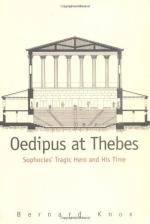|
This section contains 4,211 words (approx. 15 pages at 300 words per page) |

|
SOURCE: Allentuch, Harriet Ray. “Is Corneille's Œdipe Œdipal?” French Review 67, no. 4 (March 1994): 571-79.
In the following essay, Allentuch regards Oedipus as representative of Corneille's subconscious dramatic concerns.
Corneille's now forgotten Œdipe (1659) was one of the triumphs of his long dramatic career. It pleased his new patron, Fouquet, and enthralled audiences at court and at the Hôtel de Bourgogne. With Œdipe Corneille reemerged as the premier French tragic dramatist of his day: the play ended his seven-year retirement from the stage and its success removed the sting of failure associated with Pertharite (1652). For several years Œdipe continued to enjoy an audience; the Comédie Française presented it ninety-four times between 1680 and 1729.1 But since the eighteenth century no one has seen a performance of the work, and among critics and Corneille scholars, none urges a revival. Most of them view Corneille's play as, at best, a strange medley...
|
This section contains 4,211 words (approx. 15 pages at 300 words per page) |

|


